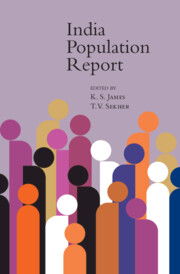6 - Social Security Schemes for the Elderly in India
Awareness, Utilization, and Barriers
Published online by Cambridge University Press: 15 August 2023
Summary
Introduction
The United Nations’ Population Division (2019) projects global life expectancy to reach 74.5 years for males and 79.1 years for females by 2050. With approximately 1.40 billion inhabitants in 2021, India is projected to become the world's most populous country in 2023, surpassing China. In the 2011 census, the elderly population, aged 60 years and above, totalling to 103 million in number, accounted for 8.6 per cent of India's population. The share of the elderly population is projected to further rise to 19.5 per cent (around 319 million) by 2050 (Registrar General of India [RGI], 2011).
The dramatic and widespread nature of these ongoing demographic shifts indicates that the population-ageing challenges that India will face are both inevitable and exist on an enormous scale. These demographic changes present complex health, social, and economic challenges to which this heterogeneous country must rapidly adapt, both in the present and going forward into the future.
Social welfare schemes play an important role in addressing the problems of the weaker and vulnerable sections of society, particularly the elderly. The government has launched many policies and programmes for the welfare of the elderly, and such programmes are designed to enhance their quality of life. Apart from national schemes, there are many state-specific schemes for the welfare of the elderly that provide healthcare and economic support for older people. To access and avail themselves of the benefits, the elderly need to be aware of the relevant schemes and programmes implemented by the central and state governments. Many eligible elders are not aware of these schemes, or even if they are aware, they do not receive the benefits of such schemes for various reasons.
In this chapter, we discuss the three major social security schemes for the elderly in India. The Indira Gandhi National Old Age Pension Scheme (IGNOAPS) was introduced in 1995 as part of the National Social Assistance Programme (NSAP) to provide financial assistance to the elderly poor. The scheme was later transferred to the states in 2002–03 for implementation with additional central financial assistance. The main objective of this scheme is to provide social security to make older people economically independent.
- Type
- Chapter
- Information
- India Population Report , pp. 199 - 245Publisher: Cambridge University PressPrint publication year: 2024

